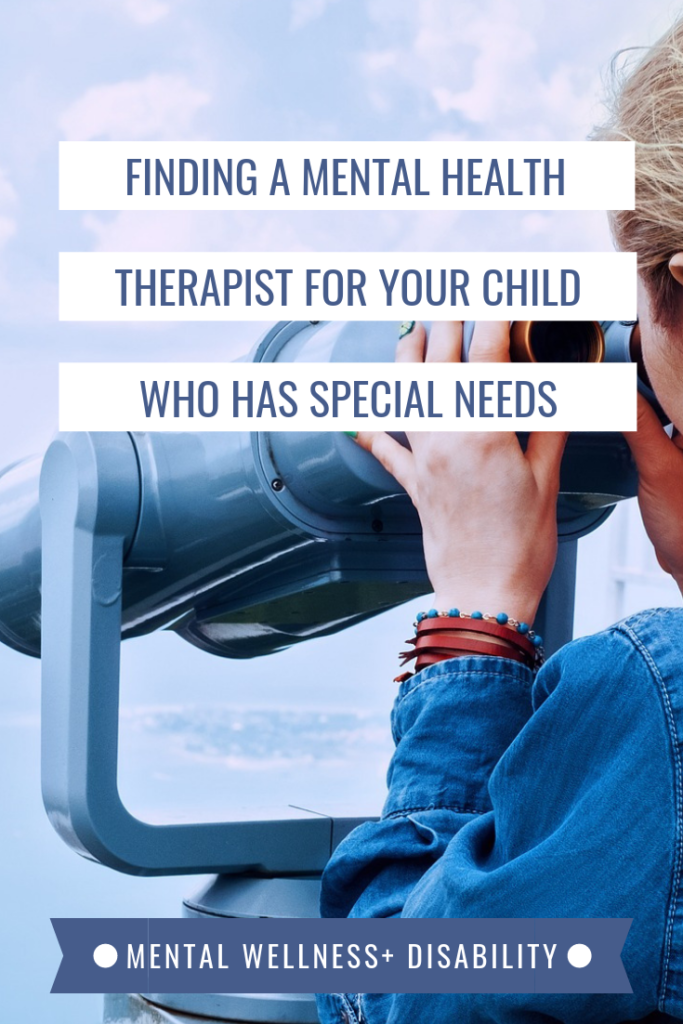“Help! My child has a disability and I can’t find a mental health therapist to meet with them!”
In addition to hearing this plea from my counseling clients who have children with disabilities, I get 3-4 variations of this email a week from people around the world. These parents are desperate to know how to find a mental health therapist for a child who has special needs.
In a few cases I’ve actually personally known someone in their area that I can refer them to (yay!). More often, I’ve only been able to offer suggestions for how to search for a therapist in their local area.
What I’ve included in this list are all of the ideas I can think of for finding a local mental health therapist who can help your special needs child.

What to do before you start looking for a counselor who will understand your child’s disabilities
First, make sure what you need is a mental health therapist. I get many calls from people wanting to schedule with me who, it turns out are actually in need of the help of a different kind of professional, like an occupational therapist, an IEP consultatant or a feeding therapist, etc.
Truly consider what has happened that’s making you think therapy is the answer. If your child didn’t have a disability, could a mental health therapist help them move towards resolution of their problem in an hour a week? If the answer is no, its possible that a counselor is not the right person to help your child, and that what you’re looking for is a different specialist.
Know the kind of therapist you’re looking for:
- Will you consider working with a therapist who is out-of-network, or must the therapist be in-network with your Insurance?
- Do they need to practice in a certain location, or be willing to meet with your child in-home?
- Are there certain days/times of the week that they need to be available?
- What about counseling methods, is there a certain theoretical orientation or therapeutic approach that they should practice?
- Must they be male or female?
- Does the right therapist for your child need to be LGBTQ+ or trans affirming?
Think through all of these questions ahead of time, so that you can share any ‘must haves’ with the people you’re contacting. This will help them to provide you with appropriate referrals, which will hopefully save you time and headache.
Once you’ve done that, your search can really begin.
Searching on the Internet to find a mental health therapist who can help your special needs child
Good old Google search. Search for a combination of ‘counseling’ or ‘therapist’ and your child’s diagnosis. This can get a bit tricky if your child’s disability usually involves a lot of other therapies (speech, OT, physical therapy, etc.). If that’s the case just stick to using ‘counselor’ as a search term.
*A note on diagnosis. If your child has Autism or Down syndrome there will likely be local, diagnosis-specific resources you can connect with. If your child has Allan-Herndon-Dudley syndrome, for example, your options are going to be far more limited. At last count I believe there are about 25 people worldwide who have this diagnosis. I have a handful of clients whose child is the only person in the world known to have a specific genetic anomaly.
I point this out to encourage you to think of your child in terms of their characteristics and symptoms, and not feel that you need to stay bound by their diagnosis. There are many rare and unique genetic syndromes that result in similar presentation, whether that’s mild intellectual disability, musculoskeletal abnormalities, sensitivity to sensory stimulation, etc. If your child has one of these rarer conditions, don’t feel that you can’t access the resources offered by Down syndrome or Autism or Traumatic Brain Injury associations. Odds are that if a therapist is able to work with those populations, they’ll be able to help your child, too.
Psychology Today. Psychology Today is a database of therapists practicing in the US, Canada, and the UK. If you live in one of those regions and search for a counselor in your city, the first few hits will likely be from Psychology Today listings. Potential clients can filter to ensure that they find a therapist who matches their budget, location, and treatment needs. This includes filtering for those who specialize in Autism, Developmental Disabilities, Intellectual Disabilities, TBI, and other categories.
What’s important to know is that Psychology Today is a paid service for therapists. Some therapists with a highly specific niche or well-established practice won’t have a page, because they don’t need to. I keep a full practice from other referral sources, so, I don’t need to pay for a Psychology Today profile listing. It’s quite possible that there are disability specializing therapists in your area who aren’t using Psychology Today.
Consider teletherapy. If your search results indicate that the closest therapist who might help is across the state, don’t give up just yet. An increasing number of therapists are offering teletherapy, or online mental health therapy. The set-up will be similar to Skype, where you can hear and see your therapist, but should be offered using a HIPAA compliant software. Here in the US the laws differ by state regarding the conditions under which teletherapy can be offered. The most common of these is that the therapist must be licensed in the state in which the client is located. If you find someone who is within your state or province it may be worth reaching out to see if they can offer online therapy.
Ask in the Facebook moms group. If you try this method, it can be helpful here to not focus so much on diagnosis. For instance, you might say “my son has Autism, but what’s he’s really struggling with is feeling anxious about moving from elementary school to middle school and having to make new friends. It’s been affecting his sleep and his appetite. Can anyone recommend a child therapist who helped their kid with similar anxiety symptoms?”
Do a search for a Facebook group of therapists in your area. This one is a bit of a Hail Mary, but something you can try if you’re really stuck. Search Facebook to see if there’s a closed group for therapists in your community. These groups are typically highly vetted to ensure that only licensed professionals are joining. Odds are that you won’t be able to join the group. You could, however, try to reach an admin via private message to see if they can post your referral request to the group.
Using local resources to find a mental health therapist who can help your special needs child
Talk with other healthcare professionals who support your child. Check with other members of your child’s support team to see if they can recommend a therapist they’ve worked well within the past.
Ask at school. Check with your child’s Special Education teachers or other sympathetic administrators. They may know of therapists who have helped other kids, or who have provided consultation to the school, etc. It’s also possible that the school counselor might be able to see your child, or to refer to you to someone they endorse in the community.
Ask at your place of religious worship. Clergy and other spiritual leaders can often recommend licensed therapists in the community. It’s important to note that some churches and other religious groups will have internal ‘counselors’ whom they refer congregants to for guidance. If your child has a true mental health need, be clear that they need to meet with someone who is licensed (and insured) to practice mental health therapy.
Try a local nonprofit or support group. This is another instance where it can help to forgo getting hung up on diagnosis. If there’s a support group for families of kids with Fragile X syndrome, but your child has Williams syndrome, don’t stress. Just reach out and see if there’s a therapist that they recommend for special needs families.
Talk to a local service provider agency. Whether they operate group homes, provide respite services, or simply offer personal care services, agencies that support people with disabilities are almost always at the front lines of searching for therapists who ‘get’ people with disabilities.
Ask a local homeschool group. Even if your child doesn’t homeschool, many kids with disabilities do choose to homeschool. If you know someone connected in a homeschool parent group, see if they can post a request for therapist who does will with kids with disabilities, or even just ‘quirky kids’.
Check with a local chapter of a national nonprofit. These might include Gigi’s Playhouse, the Arc, Easterseals, etc.). Again, don’t get too hung up on the diagnostic label. I receive many referrals from Gigi’s Playhouse, a Down syndrome achievement center, for people who have contacted them because their child has a rare chromosomal disorder.
Call the counseling center or the Psychology department at the nearest college or university. There may be a professor on staff who has a small private practice on the side . Or, there may be a faculty member who would be interested in working with your child because of their unique needs.
Research the board members of non-profits that benefit your child. Boards are often comprised of people with both a personal and a professional dedication to the mission of the organization. For instance, I’m on the Board of Directors of Kids Together, an inclusive playground in Cary, NC. Make a quick list of nonprofits whose work benefits your child. Maybe there is a therapist among their Board members.
See if your Town or City has a Disability Liaison/Inclusion specialist. In the Town of Cary, NC, our Parks and Recreation Department has a Specialized Recreational and Inclusion Specialist. They ensure that the Town offers recreation opportunities and resources to people with disabilities is available. If your town has someone similar, they may know of a therapist who works well with people with disabilities.
Check for local conferences. Perhaps Social Thinking or some other professional group is offering a conference nearby. Attend at a family rate and then mingle with attendees during break times, letting anyone who will listen know what you’re looking for. You might also find a potential therapist among the speakers or local sponsors.
Call the best therapist in your town. Look to see which therapists win ‘best of’ awards in your local newspaper. Therapists who garner these kinds of awards are typically established enough to have developed a rich network of referral partners to draw upon. They are also usually considerate folks who return phone calls. Contact them, letting them know what you’re looking for, and asking if they know someone who can assist.
National resources you can check with to find a mental health therapist who can help your special needs child
Check with Vocational Rehabilitation. In the United States, Vocational Rehabilitation (VR) is operated by the Rehabilitation Services Administration, a federal program. Each state has a VR program. The goal of VR is to aid people with disabilities in maximizing their employment, independence, and integration into the community and the competitive labor market. To do this, VR provides counseling to individuals with disabilities who need assistance in order to work. This can also include providing mental health supports to those attending school. If your child’s needs might fall into this category, check with VR to see if they qualify for counseling services.
Search for a Certified Rehabilitation Counselor. Certified Rehabilitation Counselors (CRCs) are the only professional counselors trained at the graduate level to work with clients with disabilities. While many CRCs work in Vocational Rehabilitation, some (like me!) are in private practice or other settings. The Commission on Rehabilitation Counselor Certification website includes a link where you can ‘Locate a Professional’ in your area.
Check with the NADD. The NADD is the National Alliance on Dual Diagnosis. This group is comprised of therapists, physicians, and other healthcare providers who support people with I/DD and mental health needs. I actually contacted them while working on this post. I wanted to know if there were plans to make their website more accessible for families looking for resources. It turns out that there are! I’ll update this post once this revision is live.
When you still can’t find a mental health therapist who will understand your child’s disabilities
I know special needs parents.
I know that if you give them a checklist of things to do, it will get done. It will probably get turned into an excel spreadsheet, color coded, and stored in a binder in case it’s ever needed again one day.
I’m almost positive that someone will read this list and try every single method I’ve suggested. And I’m just as sure that, after all that effort, some of you will still come up short. If that’s where you’re at, first, accept my apology. I’m sorry that I wasn’t able to give you a solution. I know that you’re just trying to find help for your child.
My best advice at this point is to go back to your team of medical support professionals. Show them everything you’ve tried, making sure they understand why counseling is so needed for your child at this point. Encourage them to get actively involved in helping you find this essential resource for your child.
I’m also sorry that, as a profession, counseling is not meeting the needs of people with disabilities.
This next statement may make me sound like a bad business owner. But one thing I wish I had more of was competition.
Here’s why.
I wish that there were more therapists who invested themselves fully in helping people with disabilities. I know that I’m not the perfect therapist for every client. I would love for all people with disabilities to have more choice when it comes to choosing a person that they will share their very private information with.
In addition to helping families, my hope in sharing posts like this is to remind therapists there are still a whole bunch of people who we’re not taking very good care of. I would love for this to inspire more therapists to do this work!
Now, will you take a moment to help me? I want this post to go as viral as a post about mental health therapy and disability can. I want every parent who is desperate to find their child a therapist to have a renewed sense of hope and fresh ideas.
Help me get the word out by pinning, sharing, emailing, tweeting, and whatever else the cool kids are doing with important posts these days. I so genuinely appreciate it!
Please leave a comment if you can share another way that parents can find therapists for their kids with disabilities. I would love to keep updating this list!












